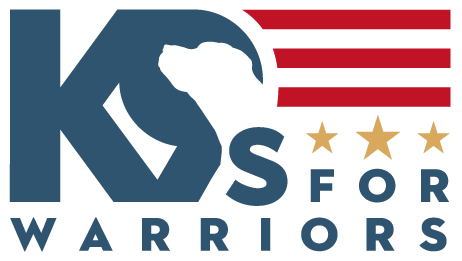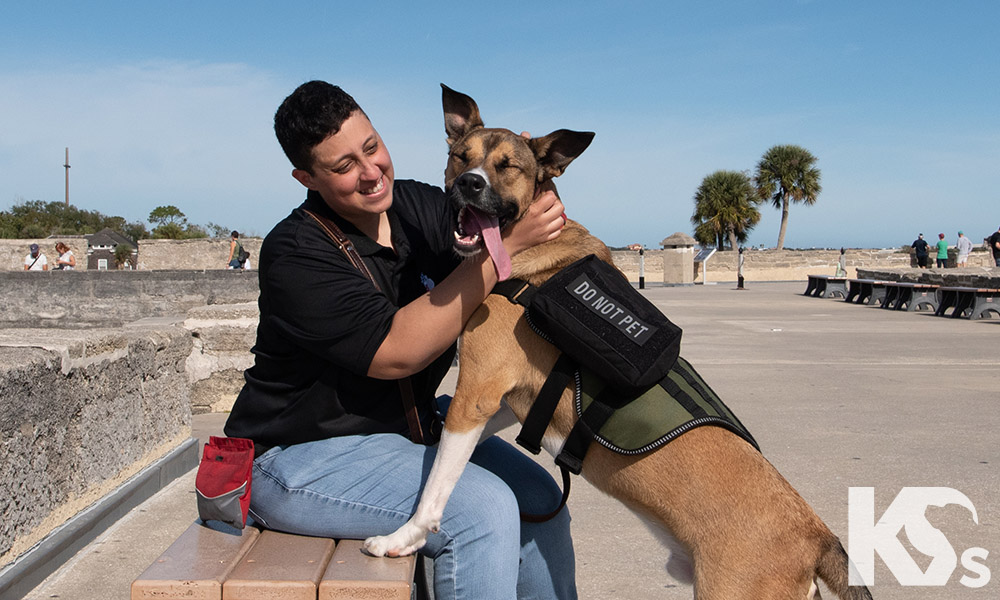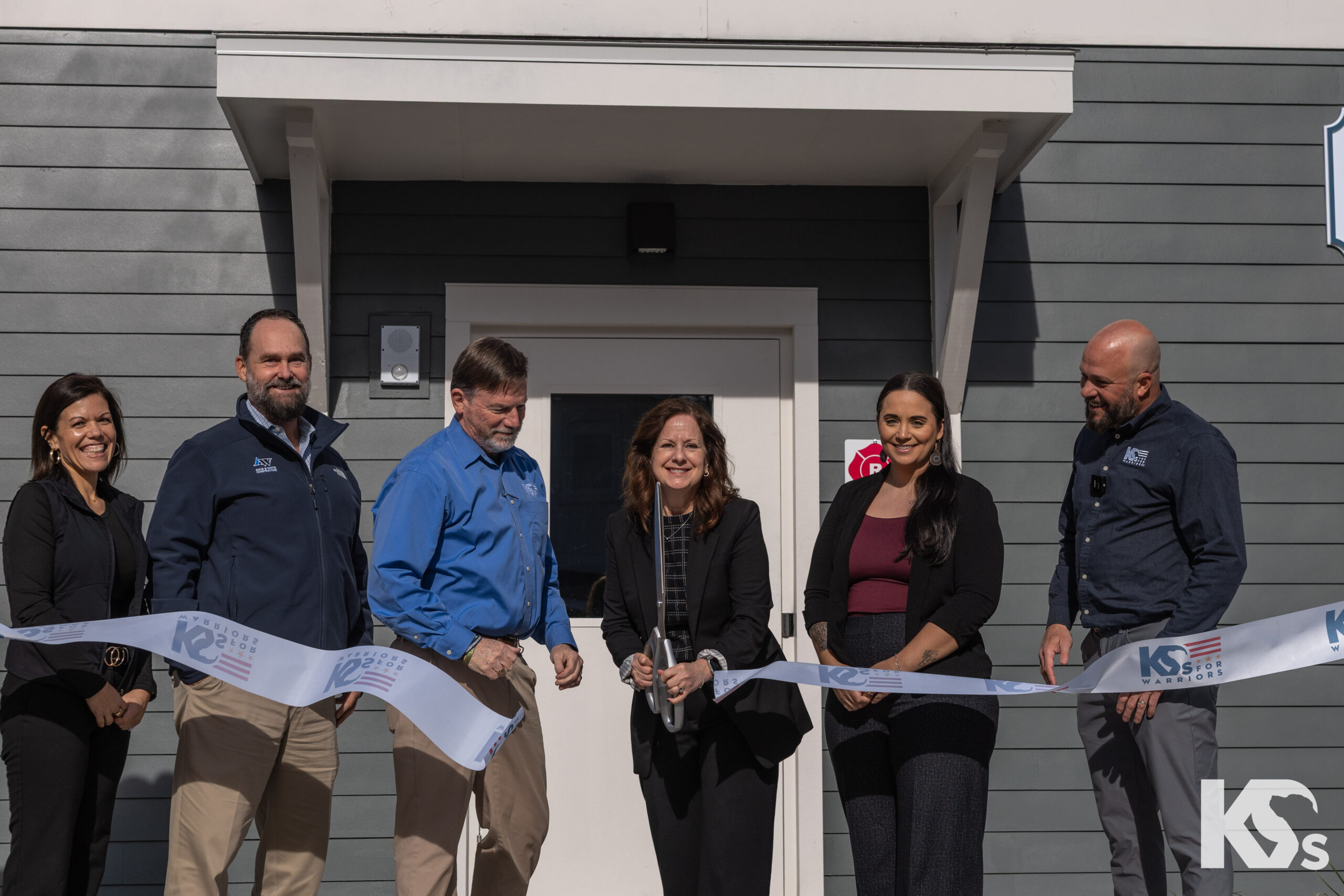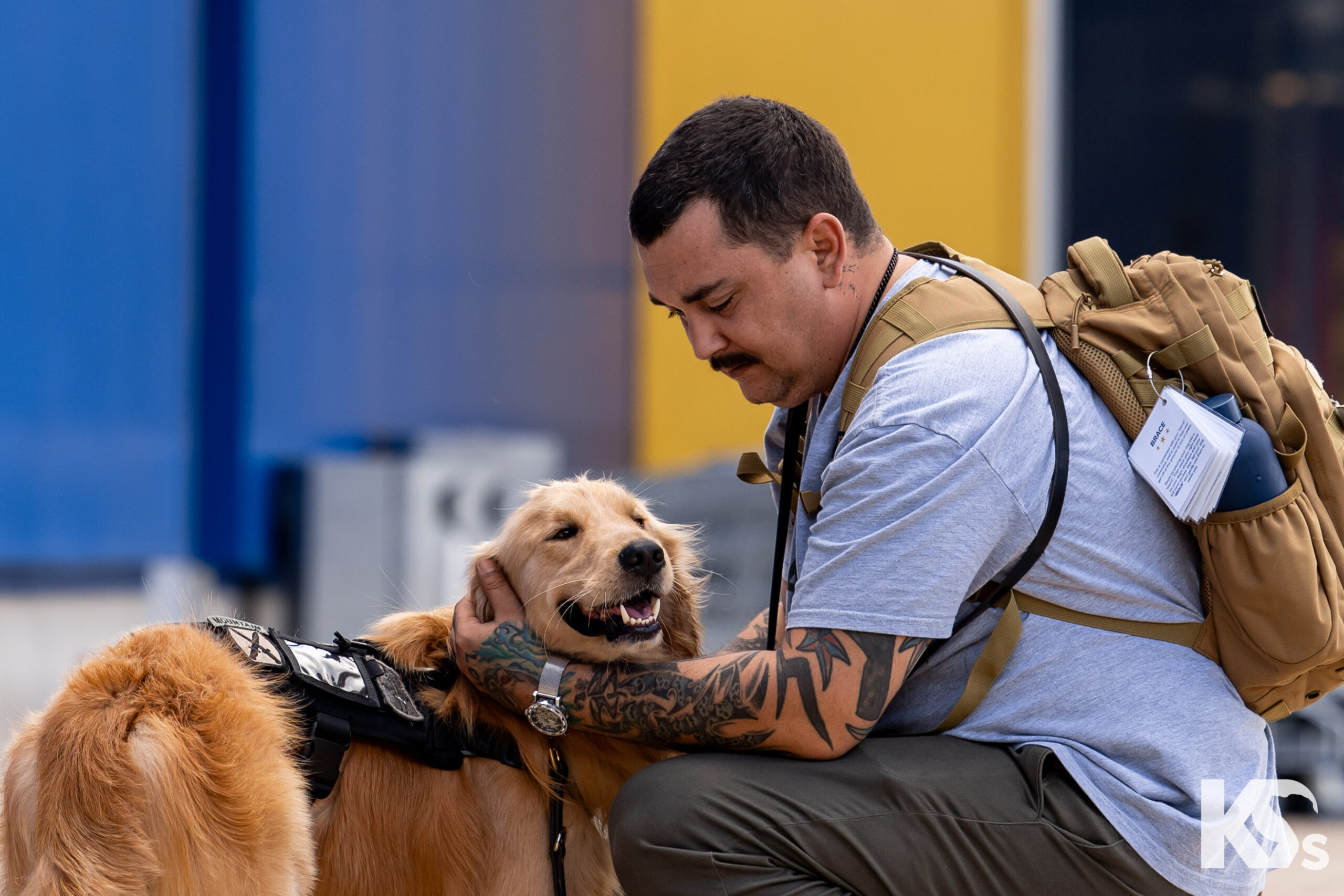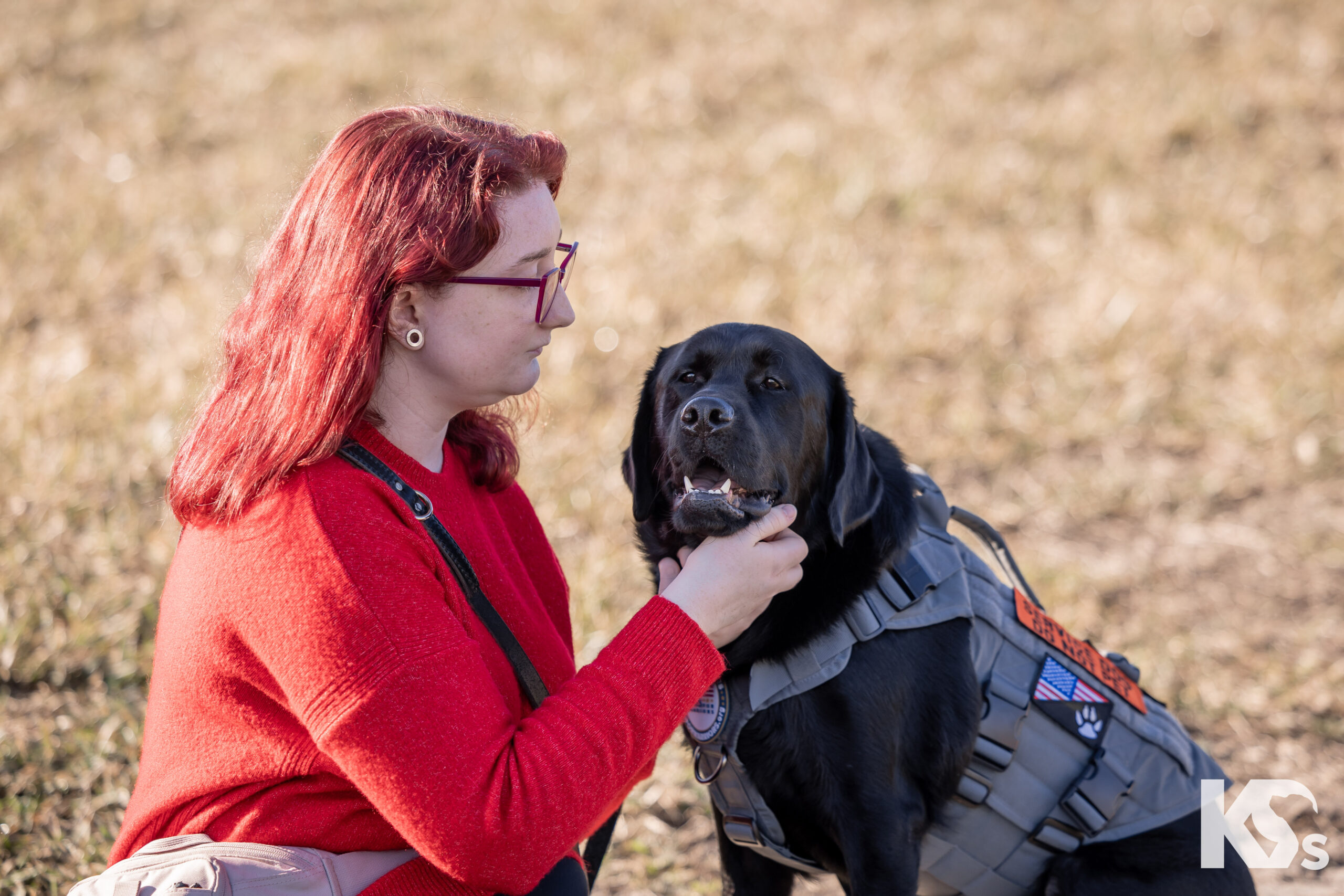“He gave me back the person I fell in love with,” Yesenia said fondly of her wife’s Service Dog, Hoosier AHEPA.
Yesenia and Natalie just celebrated their tenth anniversary — the two met at basic training for the U.S. Army. At the time, they were both dating other people and completely uninterested in each other.
“I didn’t like her at first,” laughed Natalie. “She was always talking, and she’d get me in trouble.”
Despite the rocky start, they became fast friends.
“I fell in love with her easy-going, warm and calm personality,” Yesenia remembers. “She would always be the one to push me out of my shell.”
Everything changed when Natalie returned home from her deployment. She felt lost.
“As soon as the uniform came off, I was a mess,” Natalie sighed.
This was not how it was supposed to go.
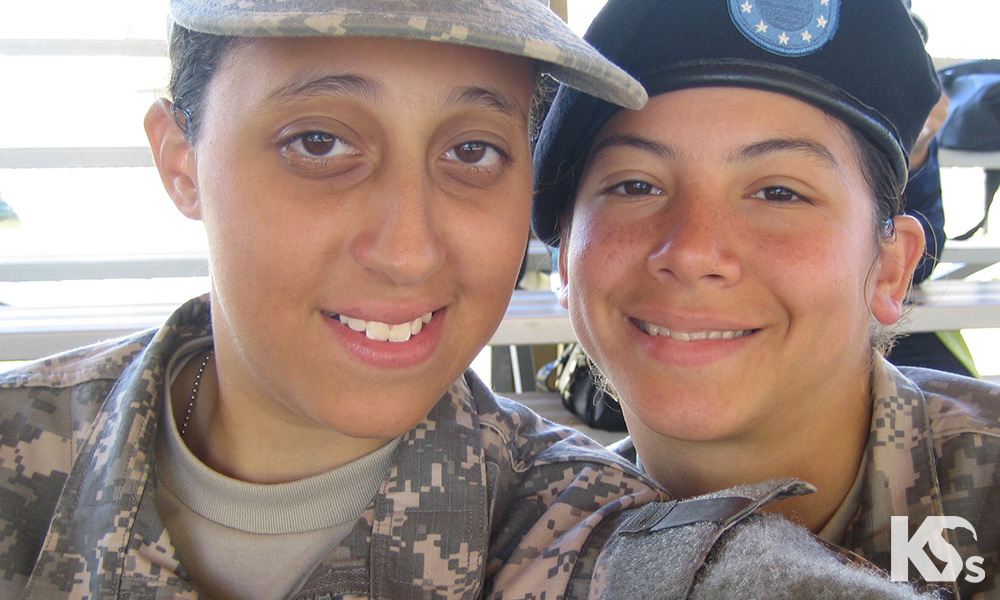
It Was Pretty Good at First
Natalie grew up in a large, tight-knit family. She was extremely social and active in school, and the military had always been on her radar.
When she broke the news of her enlistment to her family, though, they were surprised — and concerned.
“Appearance-wise, I was always very girly,” Natalie said. “They were always very protective of me, and they were freaking out a little bit. I was supposed to be going to school and graduating.”
Natalie started to ease their worries, rising through the ranks quickly. Her superiors even recommended her for officer school, a largely male-dominated field.
“It was pretty good at first,” she said.
Natalie served as a human resources specialist in the Army, assisting with promotions and logistics in traveling overseas.
“Some people say, ‘You were probably sitting at a desk. Nothing happened to you,’ but just because that was my role doesn’t mean we didn’t lose our buddies just like everybody else,” Natalie said. “That’s something people forget.”
Despite the heavy emotional load, Natalie had high hopes for her career. As a New Yorker, her patriotism ran deep, and ever since the 9/11 attacks, she’d felt a calling to serve.
“I was going to be a lifer. I was planning on staying in,” she said.
Then, she was sexually assaulted.
As a result of the attack, there was physical damage to Natalie’s hips and pelvis, limiting her mobility, leading her to walk with a cane.
“I thought I could make it a career. As time went on, things got more difficult for me in terms of my trauma,” she said.
She continued pushing through.
“I was masking everything. I thought everything would be OK,” she said.
The trauma would eventually catch up to her, though, and Natalie was medically discharged in 2011.
“There was almost a sigh of relief, especially because I didn’t make that decision. The doctors decided,” she said.
For Natalie, it meant safety.
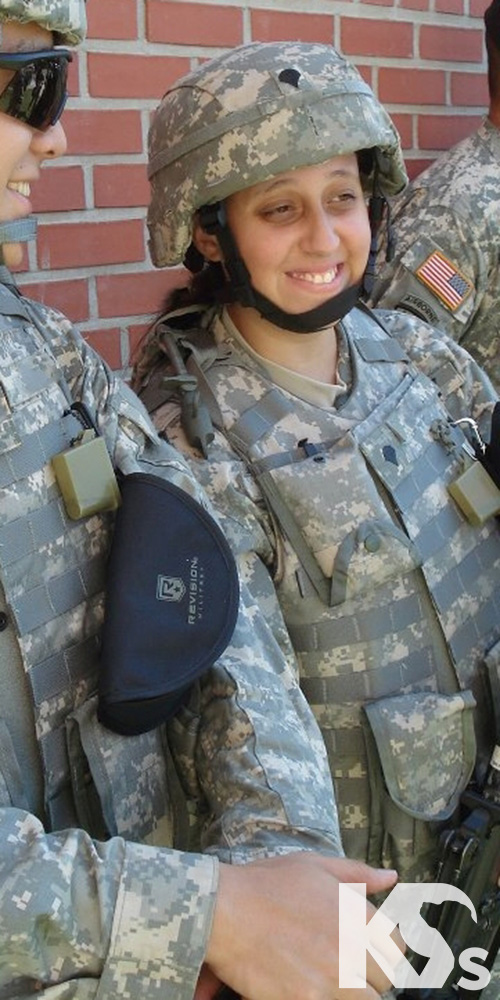
If I would have stayed in, I don't think I would be here right now.
I Didn't Want to Feel
The battle didn’t end once she got back.
“Returning home and not having that uniform on at all, I was a mess 24/7,” Natalie remembers.
She had trained herself to move and think differently while in the Army, and now she was back to square one.
When you come back home and you’re behaving differently, no one understands,” she said.
She found herself isolating and turning to alcohol.
“I didn’t even go out to check the mail,” she said. “I was drinking until blackout. I didn’t want to feel.”
As a sexual assault survivor, living in bustling New York City suddenly became her personal hell.
“I’m not a fan of people being in my bubble. If I did go out, it was certain days and hours when I knew no one was out,” she said.
She started disassociating, losing track of time.
“You feel like you’re back in the military — flashbacks,” she said.
She had her wife, Yesenia, who’d also served, to support her, but Natalie admits this nearly broke them.
“Coming home and seeing this mess, it really interfered with our relationship,” Natalie said. “We weren’t going out on dates. When I’d visit family, I’d use her as a crutch.”
Yesenia admitted her wife was not the same woman she’d fallen in love with.
“She was anxious all the time — depressed and isolating herself,” Yesenia said. “It was heartbreaking to see that.”
But Yesenia remembered the real Natalie.
“She knew the core of me,” Natalie said. “Thank God, she knew me before. I don’t think we would have survived if she didn’t.”
But there was one stumbling block they feared they couldn’t overcome.
“I always wanted to be a mother, and so did she,” Natalie said. “Coming back home, I decided that motherhood was not right for me. I felt uncomfortable bringing in a child having the issues I did.”
It almost tore them apart.
“Divorce came into play,” she said. “That’s when things got really difficult for me. I just wanted to end life.”
Natalie relapsed after another attempt at sobriety, and things were spiraling quickly.
It wasn't until a couple of suicide attempts until I really realized it was time for a change.
Don't People Get Dogs?
She felt like she’d tried it all before — therapy, medication, everything. Despite this, she trudged to the VA hospital, and sitting in front of a curious, enthusiastic intern, they scoured the internet for possible solutions together.
Clicking away on the computer, suddenly the intern spouted off, “Don’t people get dogs?”
A few more clicks on the computer and they found K9s For Warriors. The website mentioned military sexual assault Service Dogs.
Natalie printed out some information to bring home to her wife, but she was still skeptical. She wondered, “What could a dog really do to help me?”
She came home, and the two came to a decision.
“My wife and I said, ‘It doesn’t matter how you’re doing or what’s going on in our lives right now. We’re sticking together, and let’s wait until the dog gets here and we’ll reevaluate ourselves.’” she said.
This was their last chance. They’d reached a breaking point.
We were considering going our separate ways. I was doing the steps, but I wasn't getting better.
They filled out the application together, and Natalie was approved for a Service Dog, but there was a two-year wait period before she was to be paired.
Natalie said she could feel a difference almost immediately.
“Those years gave me hope,” she remembers. “I decided to truly get sober.”
She started putting in the work, and before she knew it, it was time to make the trip to Florida to meet her new Service Dog.
Our Lives Changed
Hoosier AHEPA. The perfect match.
The duo trained together for three weeks on the K9s For Warriors campus before Natalie’s wife Yesenia flew down to celebrate their graduation. As soon as she saw Natalie, she could immediately sense the change.
“The first day my wife came to graduation I remember her saying, ‘Wow, you’re actually smiling,’” said Natalie. “The day the dog got here, our lives changed.”
On the day Natalie returned home with Hoosier AHEPA, she promised herself she’d never take another drink. She is now three years sober.
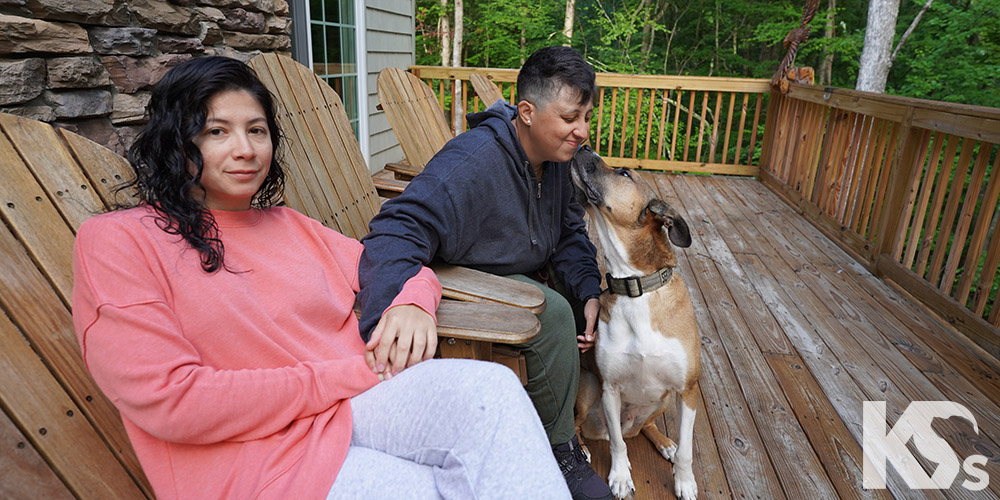
“No one is perfect nor any Service Dog, but if there is one thing I am sure about,” said Natalie’s wife Yesenia. “Hoosier is perfect for Natalie and our family.”
While Natalie still struggles with the after-effects of her trauma, Hoosier is always by her side.
“I needed someone to push me, and he pushes me,” Natalie said.
Natalie, once fearful of everything — leaving her house, retrieving the mail, grocery trips — felt at ease with Hoosier AHEPA.
“Sometimes, you know how it feels to be at the bottom. Anxiety. Panic attack. You feel fearful of hitting that rock bottom,” she said.
You don't want to hit rock bottom, but Hoosier says, 'I've got you.'
Hoosier AHEPA is there with her through it all— even as Natalie and Yesenia look to expand their family, something she once feared impossible.
“Because of Hoosier, I decided to become a parent,” her eyes lit up. “Hoosier will be a big brother.”
With Hoosier AHEPA by her side, she feels confident she can tackle just about anything.
This, Natalie knows for sure.
He literally saved my life. I wouldn't be here if it weren't for him.
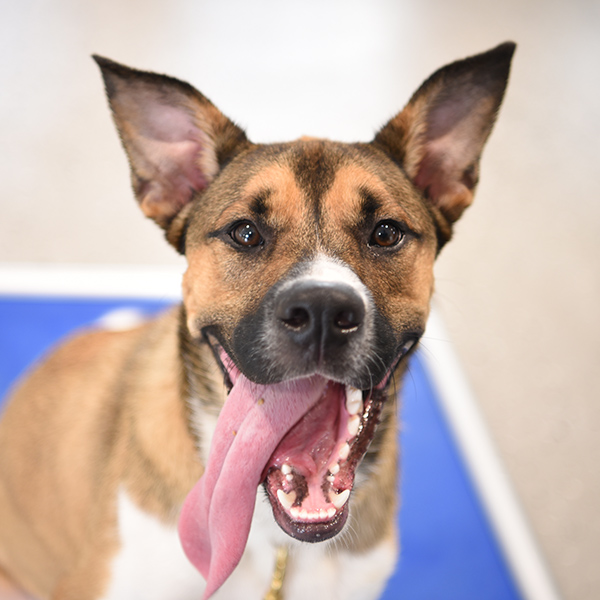
Natalie & Hoosier AHEPA’s Graduation Date
December 2019
Hoosier AHEPA’s Start
He was donated by Etowah Valley Humane Society in Georgia
Hoosier AHEPA’s Sponsor
Hoosier was sponsored by AHEPA Chapter # 78 and AHEPA District 12 in the state of Indiana
Hoosier AHEPA’s Name
Hoosier is the official demonym for a resident of the U.S. State of Indiana.
